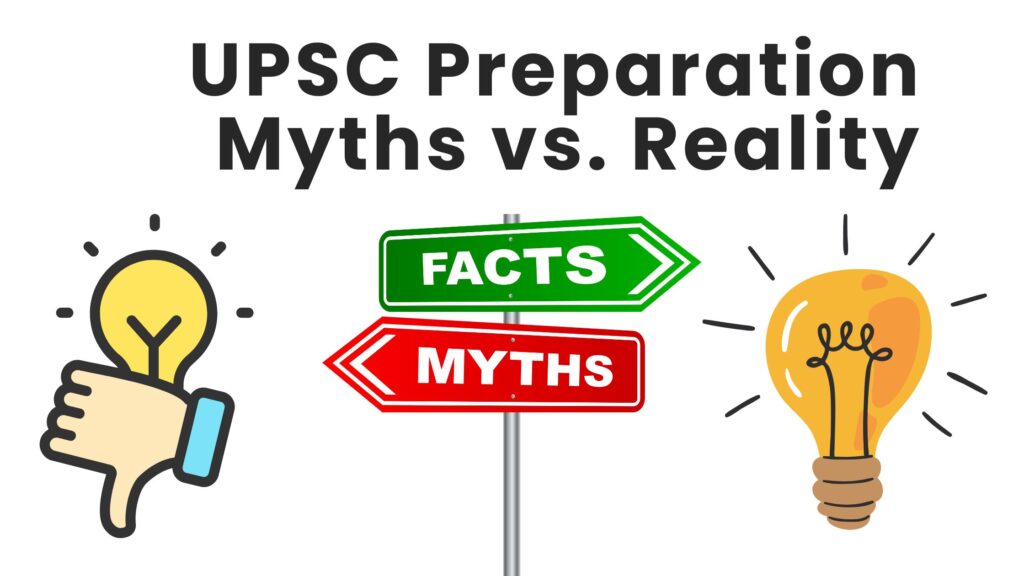The Union Public Service Commission (UPSC) exam is one of the most prestigious and challenging exams in India. Every year, thousands of aspirants begin their journey with the dream of clearing the exam and securing a spot in one of India’s elite services. However, there are many myths surrounding UPSC preparation that can lead to confusion and frustration. In this blog, we will discuss some of the common UPSC preparation myths and compare them with the reality to help you understand the true essence of this exam and how to approach your preparation.
Myth 1: You Need to Study for 16-18 Hours a Day
One of the most widespread myths among UPSC aspirants is that you need to study for 16-18 hours a day to crack the exam. While it is true that UPSC preparation requires consistent and focused effort, it doesn’t mean you have to spend all day buried in books. In reality, quality matters more than quantity when it comes to studying.
Reality: Effective UPSC preparation is about smart studying. You don’t need to study for long hours, but you should focus on quality study sessions. A productive 6-8 hours of study, with regular breaks and revision, is often more effective than long, exhausting study marathons. It’s crucial to maintain a balanced approach and not overexert yourself. UPSC requires smart work, not just hard work.
Myth 2: Reading Multiple Books for Every Subject is Necessary
Many aspirants believe that they need to read multiple books for each subject to be thorough in their preparation. This often leads to confusion and overwhelm, as they try to cover every book and resource available in the market. The truth is, trying to read everything can actually hinder your preparation.
Reality: While it’s essential to cover the syllabus comprehensively, it’s also important to choose the right resources. Focus on a few standard textbooks for each subject and make sure to revise them thoroughly. For example, NCERTs are the foundation for subjects like Geography, History, and Political Science. After completing the basics, refer to a couple of advanced books or materials like standard reference books, current affairs, and UPSC-specific resources.
Remember, overloading yourself with multiple books can lead to information overload, and you may not be able to retain what you study. Stick to a few trusted resources and revise regularly.
Myth 3: You Need to Be a Genius to Clear UPSC
Another myth that discourages many aspirants is the belief that only geniuses or exceptionally bright students can clear the UPSC exam. People often think they must have extraordinary intelligence or a superior academic background to succeed.
Reality: UPSC is not about being a genius; it’s about consistent effort, time management, and smart strategy. Thousands of candidates with different educational backgrounds clear the UPSC exam every year. All you need is determination, perseverance, and a well-planned study strategy. Anyone with a focused approach and dedication can crack this exam. Intelligence plays a role, but hard work, time management, and correct guidance are much more important.
Myth 4: You Must Be From a Specific Stream (Science/Engineering/Arts) to Clear UPSC
There’s a common misconception that only students from a certain academic stream, like engineering or medical, are more likely to clear the UPSC exam. Some people believe that students from arts backgrounds or non-technical streams may not have the necessary knowledge to clear the exam.
Reality: The UPSC exam does not favor any particular stream or academic background. It is an equal opportunity exam where candidates from all fields can succeed. The key is to understand the syllabus, plan your preparation accordingly, and choose your optional subjects wisely based on your interests and strengths. Many aspirants from arts, commerce, and other non-scientific backgrounds have cleared the UPSC exam with flying colors.
Myth 5: Current Affairs is Only for the Mains Exam
Many aspirants think that current affairs are important only for the UPSC Mains exam and not for the Preliminary exam (Prelims). This misconception can lead to a lack of focus on important current events during the preparation period, especially for those targeting the Prelims.
Reality: Current affairs are an integral part of both the Prelims and Mains exam. In fact, current affairs form a major portion of the General Studies paper in both stages. Staying updated with current affairs, reading newspapers daily, and following key developments related to national and international issues, government policies, and socio-economic trends are crucial for both stages of the exam.
For Prelims, focus on current events from the last 12-18 months. For Mains, a deeper understanding and critical analysis of current affairs are required. Therefore, current affairs should be a part of your daily study routine from day one.
Myth 6: UPSC Preparation Can Be Done Alone
There’s a common belief that UPSC preparation can only be effective if you join a coaching institute or have a mentor guiding you throughout. Some aspirants feel that self-study alone will not be sufficient to clear the exam.
Reality: While coaching institutes can provide valuable guidance, they are not a necessity for UPSC preparation. Many successful candidates have cleared the exam through self-study, relying on online resources, books, and group discussions. Self-study allows you to set your own pace, focus on areas you feel need improvement, and customize your study plan according to your strengths and weaknesses.
If you feel the need for additional support, you can always seek guidance from online platforms, mentors, or peer study groups. The key is to stay disciplined, focused, and organized in your study approach.
Myth 7: You Need to Memorize Everything
Another widespread myth is that you need to memorize everything to crack the UPSC exam. This leads to unnecessary stress and the fear of forgetting crucial details.
Reality: UPSC exams are more about understanding concepts and developing analytical skills than memorization. While you will need to remember some factual information (such as historical events, geographical data, and government schemes), the focus should be on understanding the core concepts, connecting ideas, and being able to analyze and apply them. For Mains, especially in the essay and GS papers, it’s your ability to think critically and present your arguments logically that matters more than rote memorization.
Myth 8: You Must Avoid Socializing and Have a Completely Isolated Life
Some aspirants believe that to succeed in the UPSC exam, they need to avoid all social interactions, isolate themselves from friends and family, and focus solely on studying. This can lead to burnout and a lack of mental well-being.
Reality: While UPSC preparation requires dedication and focus, it is important to maintain a healthy balance in your life. Socializing, spending time with family and friends, and taking breaks are essential for maintaining mental health and avoiding burnout. A balanced lifestyle will keep you motivated and energized throughout the long preparation journey. Remember, UPSC preparation is a marathon, not a sprint.
Conclusion
UPSC preparation is a challenging yet rewarding journey, and understanding the myths and realities surrounding the process can make a significant difference in your approach. The key is to stay focused, be consistent, and adopt a smart and balanced strategy. By debunking common myths and understanding the true nature of UPSC preparation, you can approach this exam with a clearer and more realistic mindset.
Focus on smart study techniques, choose the right resources, and, most importantly, take care of your physical and mental health. With the right approach, dedication, and perseverance, you can successfully navigate the UPSC exam and achieve your dream of joining the Indian Civil Services.
If you enjoyed this blog, don’t miss out on our previous one How to Begin UPSC Preparation from Scratch?




